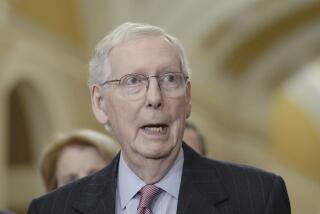Those Little Senate Things Mean a Lot
- Share via
If, as seems certain, Sen. Jim Jeffords of Vermont leaves the Republican Party today, many explanations will be put forward as to why he made the shift that gave Democrats control of the Senate. But amid the considerations of geography and personality, there’s an institutional explanation--the term-limit policy established by the GOP in the ‘90s--that Republicans ought not to ignore, because it could bite them yet again.
First, and most obviously, Jeffords’ decision to become an independent coincides with the geopolitical shift in the Republican Party. At one time, Vermont was the most Republican state in the union. In the 1936 presidential election, the first such contest of Jeffords’ life--although at age 2, he played no role--Democrat Franklin D. Roosevelt carried 61% of the nationwide vote and all but two states, one of them being Vermont. Indeed, until 1964, Vermont was the only state never to have voted Democratic for president.
But in the decades since, the GOP’s center of gravity has moved to the Sunbelt; today, Jeffords could fairly argue that he didn’t leave the Republican Party he was born into, but rather, it left him.
A second factor is personal pique, which should never be underestimated. As has been widely reported, Jeffords was angry that the White House did not invite him to watch a Vermonter receive a teacher of the year honor from President Bush in April. Defending the White House, spokesman Ari Fleischer argued Wednesday, that if the president invited one lawmaker, then “we’d have to invite them all.” Fair enough. But great political events have often turned on hurt feelings, justified or not.
The 1916 presidential election, for example, hinged on the failure of Republican candidate Charles Evans Hughes to schmooze his fellow Republican, Gov. Hiram Johnson of California. Although they were staying at the same San Francisco hotel, they never got together; Johnson took offense and did nothing to help the national ticket in November. Hughes lost the Golden State by just 4,000 votes, even as Johnson won his own election by more than 300,000 votes. And so Democrat Woodrow Wilson became president, and the GOP lost one of the closest elections in U.S. history.
Of course, just as every electoral vote counts in a close election, so every vote counts in a closely divided legislative chamber. And since every politician is at least one part ham, a third reason for Jeffords’ defection might be that he is enjoying the attention. Indeed, Jeffords was originally going to switch Wednesday, but then delayed it till today, ensuring himself another 24 hours in the news.
But a fourth explanation is most likely the most important. On Capitol Hill, the common currency of power is a committee chairmanship; Jeffords, first elected to Congress in 1974, had to wait two decades to become chairman of the Education and Labor Committee, and so he is naturally loathe to give up such a powerful and perky position. If Senate Republicans were to lose even a single seat in the 2002 midterm election--and they lost five in the 2000--then all Republicans would lose their chairmanships. So Jeffords might see an advantage in aligning with what looks to be the next winning team.
A fifth factor may have made Jeffords’ decision easier: After taking control of the Senate in 1995, Republicans established term limits for chairmanships. This was in keeping with their “revolutionary” thinking, but for a moderate careerist such as Jeffords, it put a premature cap on a lifetime of service. As the Burlington Free Press reported on Wednesday, Jeffords, just reelected to a six-year term in 2000, has made it clear he “did not relish the idea of spending four years with no chairmanship.”
By contrast, the Democrats, unburdened by a term limits rule, have offered Jeffords what could well be a chairmanship for life. If such concerns--which could affect other senior Republicans, too--seem petty in the scheme of things, maybe that’s because they are. But great events--as never-to-be-president Hughes discovered in 1916, and as likely ex-Majority Leader Trent Lott may now discover in 2001--oftentimes hang on the smallest of causative explanations.
More to Read
Get the L.A. Times Politics newsletter
Deeply reported insights into legislation, politics and policy from Sacramento, Washington and beyond. In your inbox twice per week.
You may occasionally receive promotional content from the Los Angeles Times.










